Half-starved as a Child, She Fed Everyone
Life-lessons Mama Taught Me
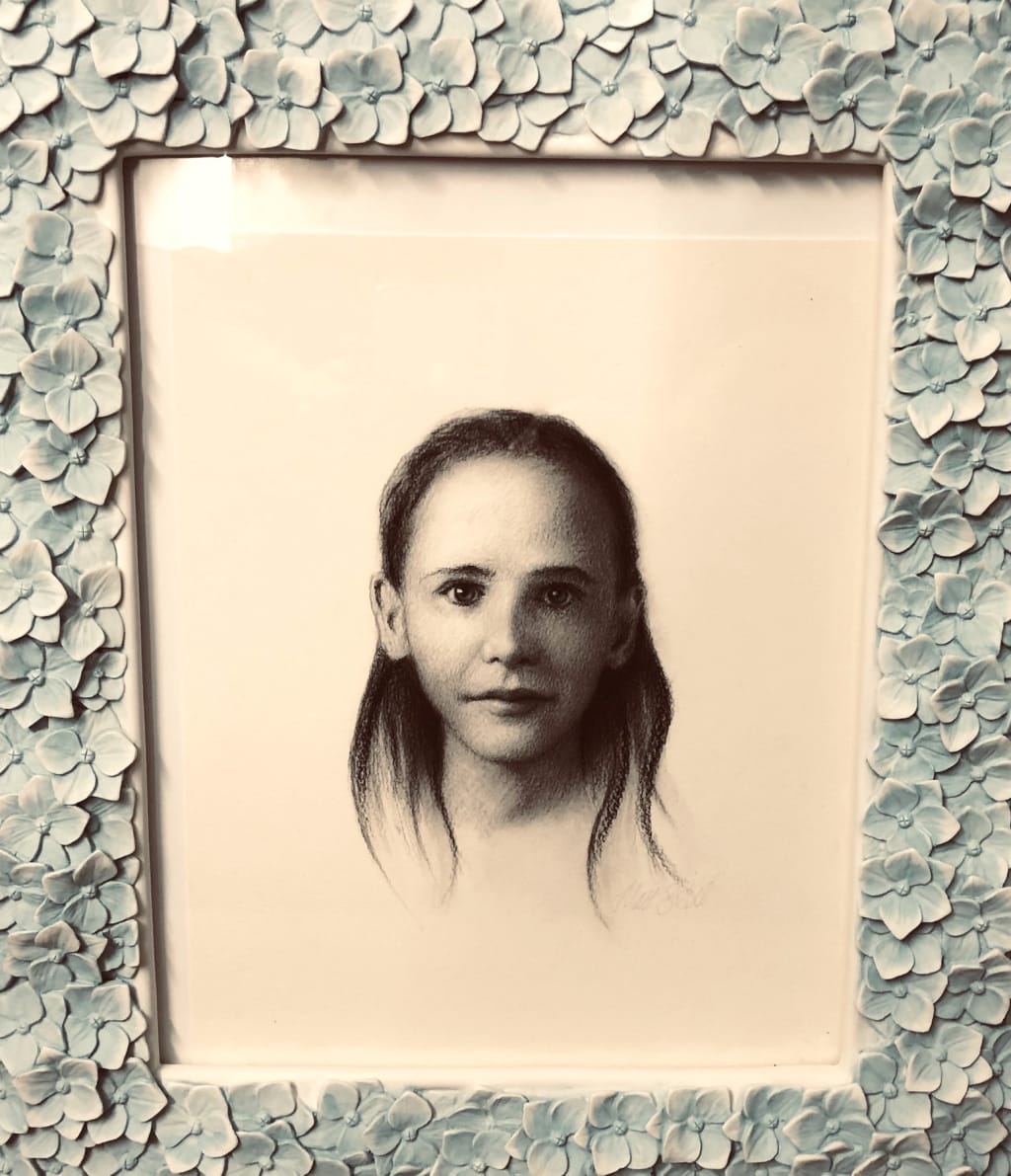
Everyone who comes into my house for the first time always comments on the wall of photos featuring family members cooking in the kitchen. It is to honor my mother, Dortha Fox Bowen, who was half-starved as a child, but made sure her younger siblings were fed—as well as everyone around her, for the rest of her life. I'm well into my sixties now, and my mother has been sleeping in death for many years. But, the many life-lessons Mama taught me from her fine example in several areas, live on.
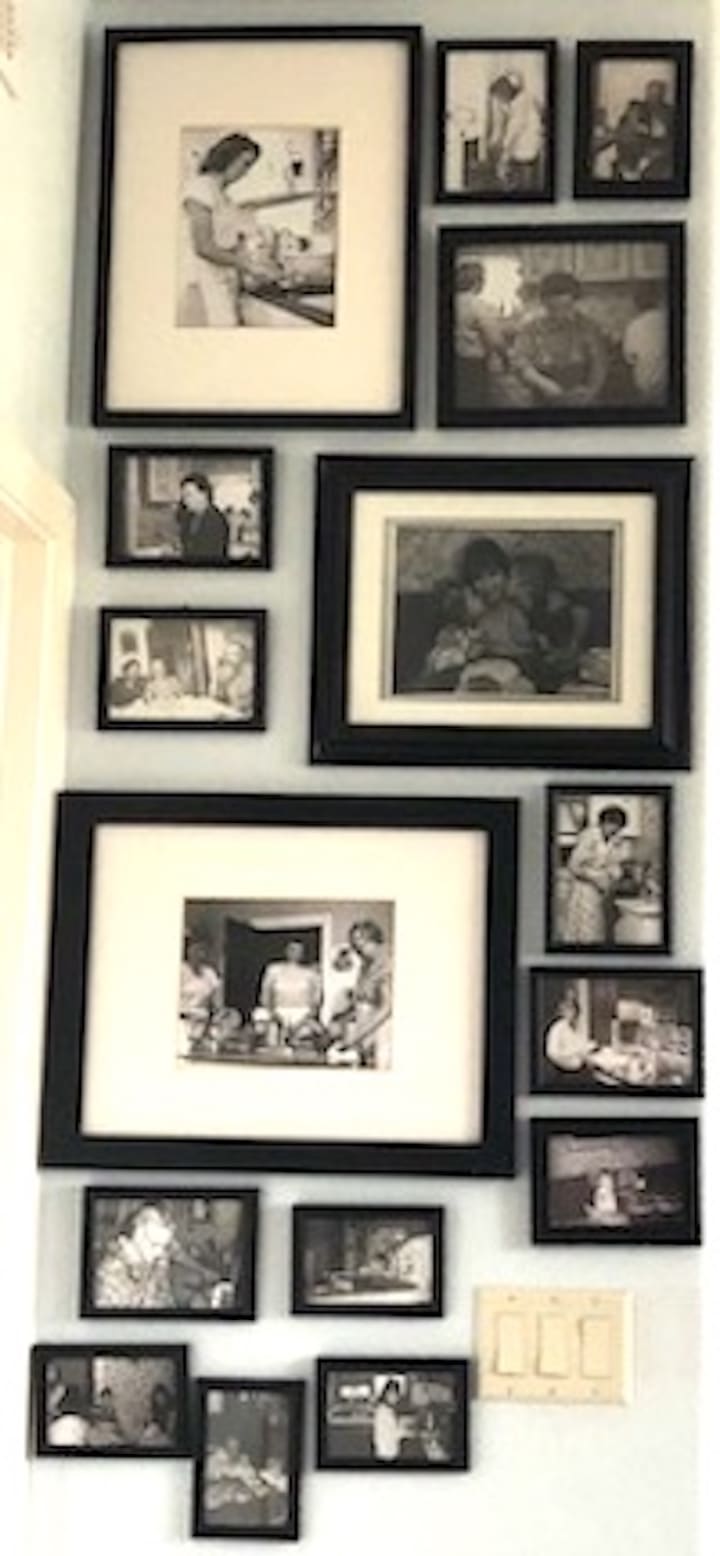
Mama was the culmination of a long line of strong women:
When I adjusted Mama's new dress as she lay in her casket, I remembered when she adjusted my wedding dress years before... Her advice to me was valuable, and still rings true to this day: "Feed your family. And insist on everybody eating together at the table. Then, feed someone else who doesn't have a table to eat at or a family to share it with."
But first, let me tell you a little history about a few of the many strong women who came before Mama... In the dead of winter, my great-great-grandmother carried her baby as an infant for the many, many, MANY miles she walked from Georgia to Oklahoma, on the forced death-march that would become known as "The Cherokee Trail of Tears". Only 18 summers old, she managed to keep her baby alive on that freezing, snowy death-march; while on every stop along the way, more and more newly-dead ones were buried.
Despite growing up in far less than ideal conditions on the Reservation, that baby, my great-grandmother, whom Mama called "Enisi" (which means paternal grandmother in Cherokee); grew up to speak three languages: Cherokee, English, and French. She was what some describe as a "Medicine Woman”—so proficient in using herbs to treat illnesses, that even though many townspeople in Oklahoma called her a "squaw", they also called upon her for help when they were sick. But, she hid all the income she made under her mattress because she didn’t trust that that the people who ran the banks wouldn’t steal her earnings (as others had stolen her people’s homes and land). She was apprehensive, not racist—she married a white man, after all… Unfortunately, her husband’s true character didn’t reveal itself until he deserted her for a younger white woman, leaving her in dire straits. My great-grandmother struggled to provide for her son, whom others labeled a "half-breed". As a result, their close-knit relationship (that my grandfather treasured), forged a very strong bond—and she lived with him for the rest of her life. Forced to choose which culture to live among, her son, my grandfather (whom I called "Pa'apaw"), settled in the "boot-heel" of southeast Missouri. He found greater acceptance there, because neighbors and townspeople assumed he was completely white—despite having Fox as his last name. He never corrected them, wanting to lose the "half-breed" label.
Pa'apaw also grew up to marry a white woman, my grandmother (whom I called "Ma'amaw"). She had been won over by the fact that my Pa'apaw pulled his canoe quite a way up-river to court her, then floated home down-river afterward. They settled on a farm; both had such positive hopes for their life together, having lived through the bright days of the "Roaring Twenties". Little did Ma'amaw know what a life-and-death struggle awaited her, to keep their five children alive (losing one of them to death), through an era so difficult, it became known as the “GREAT Depression.”
I could write about any of these strong women—and others who came before them—however, my mother? She was a culmination of them all.
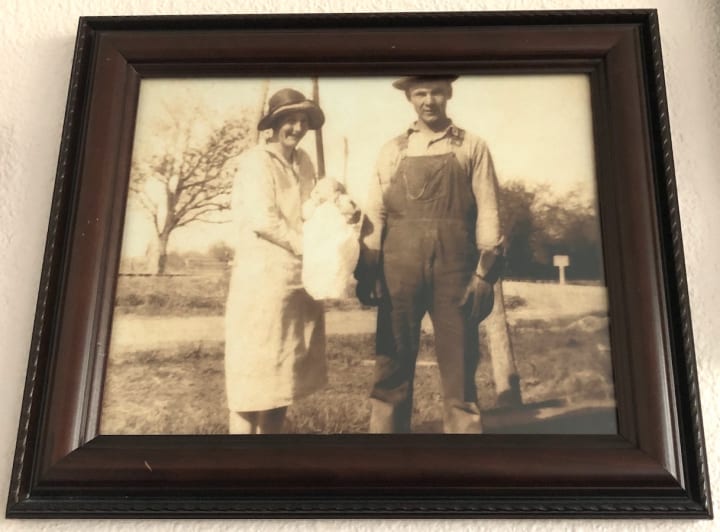
Struggling to survive during the Great Depression:
Only those who lived through it, can truly understand how difficult it was to survive during the Dust Bowl and the Great Depression. (I highly recommend either reading “The Grapes of Wrath” or watching that old movie of the same name [starring Henry Fonda]—paying attention to the mother in that story; to get a glimmer of what it was like for families during that time.) In her early school years, little Dortha and her siblings wore clothes my Ma'amaw made them from flour sacks. You see, when the flour company realized women (desperate to clothe their children) had resorted to sewing the sacks that flour came in, they kindly started printing their sacks in more suitable patterns, so children no longer had to wear garish brand-names.
Mama didn’t like to reminisce about her childhood much. My first clue of her difficult early years was when she would emphatically stress, whenever I complained that I didn’t like this or that food: “You’d be surprised at what you could eat, if you’re hungry enough!” She would get teary-eyed talking about the starving children in China and how desperate the children were to get a bite to eat during the Potato Famine in Ireland, etc. But, it was only when I was older, that I learned what she, herself, had overcome; how hungry she had been as a child—and how many people she had helped feed, all throughout her lifetime.
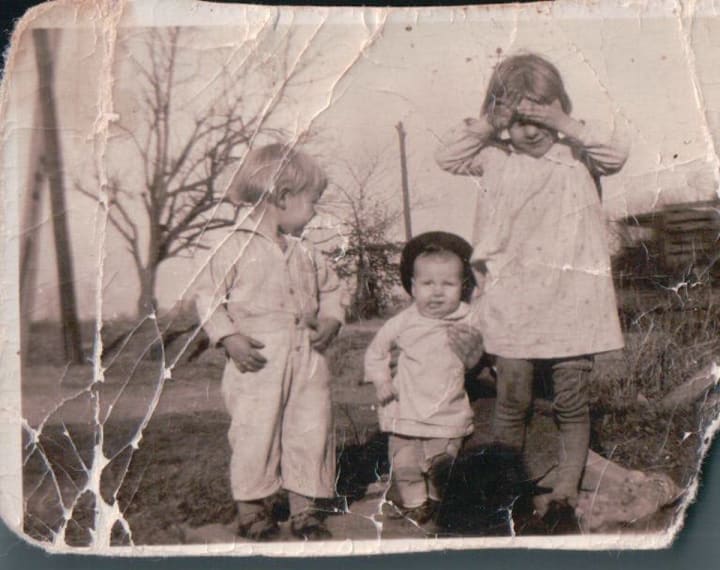
Our recent hard times over the Pandemic were nothing, compared to how difficult it was to survive during the Dust Bowl and the Great Depression. Times were SO tough, as soon as children were old enough to be of help around the house, at least one of them no longer got to go to school, for they were desperately needed to work at home. That was my Mama's fate... She often stressed to me (when I was growing up): "It's such a privilege to go to school. Don't waste the precious opportunity to get an education!" She taught me that not everybody in the world enjoys that privilege. As the eldest child, it fell upon her to leave her beloved school at an extremely young age.
I'm sure her parents didn't want to do it to her, but someone had to care for the babies; because being desperate, it fell upon Ma'amaw to bring in some income. You see, although he worked extremely hard day and night, Pa'apaw had not been able to make a living for them during those dark times. So, when Ma'amaw was fortunate enough to land a rare job at the Five and Dime store, my Mama took on adult responsibilities—though she was just a little child.
Feeding others meant often denying herself:
Mama not only had to care for her smaller siblings, she also had to feed them. Keep in mind there were no convenience foods back then; an ice house was used for refrigeration, and all cooking stoves had to be powered by adding logs of wood or lumps of coal. Mama picked produce from their precious garden to prepare food from scratch or used home-canned foods from Mason jars in the root cellar—while they lasted. It was hard work for anyone, much less a child! Whenever their food supply ran out, my old great-grandmother, Enisi, taught Mama to become proficient in foraging for food in the woods, to supplement their meager diets. (You see, in addition to caring for the little ones, Mama also had the responsibility of looking after dear old Enisi.) But whenever there wasn't enough food to go around, it was Mama who denied herself—she couldn't bear to hear her younger siblings cry from hunger.
Word spread this little girl would feed hobos for a chore:
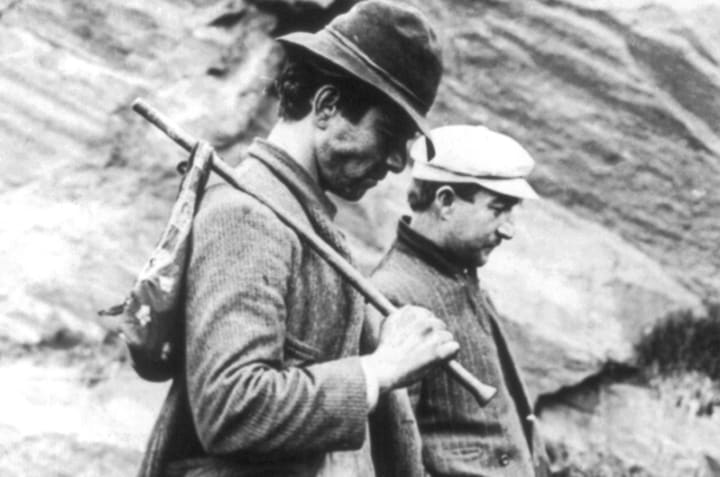
Likewise, Mama also couldn't bear to see the gaunt-looking hobos who knocked on her door, going hungry. ("Hobos" was the common-term for men who hid on trains and jumped off at every town, desperately looking for work.) Mama would sacrifice her meager meal for any hobo who knocked on her door—as long as they were willing to perform a much-appreciated chore for her, first; such as chopping some firewood for the cook stove, gathering some coal for the heating stove, or pumping some water and bringing it in so she could heat enough to fill the metal tub on the front porch—so she could bathe the children, oldest to youngest. Mama soon gained a fine reputation among the hobos, as word spread that if you knocked on this little girl's door, she would feed you in exchange for a chore.
Mama's most difficult day:
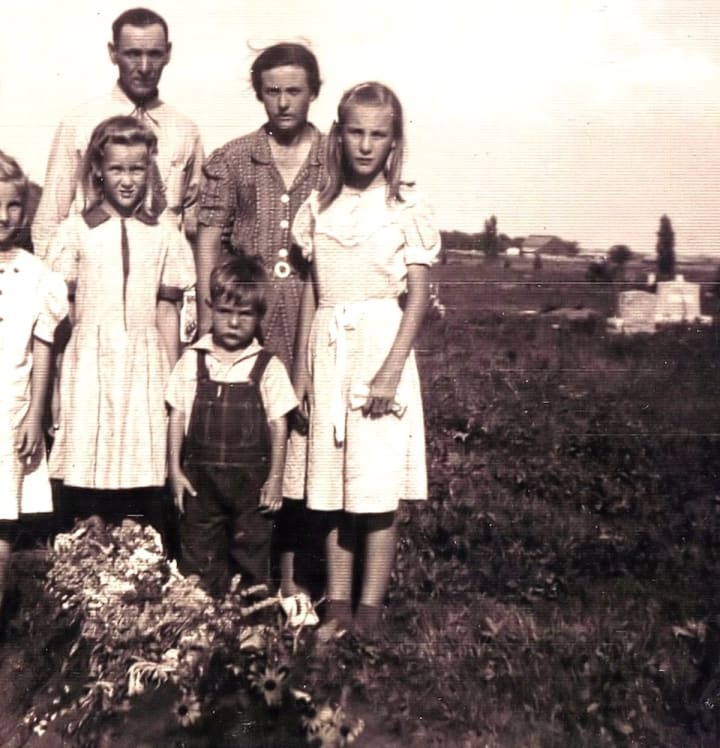
Then came a day when the baby, her youngest sibling, became very ill. Although it broke Ma'amaw's heart, she couldn't risk losing their income by staying home from work, or ALL of her children would suffer. It was a heart-wrenching decision. Her boss made it clear there was always a line of people begging for a job! Her eldest, my Mama, was still too young to fill in for her, so, it fell to young Dortha to care for a sick baby, on top of everything else. Mama's baby brother had quit eating even his meager rations. She tried everything, but the only food she had a measure of success with was some homemade applesauce she made from a tree she had discovered in the woods. (That apple tree was such a treat and a blessing!) But that wasn't enough. Even great-grandmother, with all her medical knowledge, was unable to save him. Still just a child herself, Mama was rocking her baby brother trying to soothe him, when he died in her arms. How she sobbed, dreading having to tell Ma'amaw and Pa'apaw when they came home (for they had no phone). The entire family was devastated, and Ma'amaw and Pa'apaw never got over the guilt.
Years later, when Mama almost lost my younger sister and me to the measles, it brought all that anguish back. When vaccines finally became available for polio and smallpox, Mama was a huge supporter. She was convinced that perhaps a vaccine of some sort would have saved her baby brother; if only they had been invented all those years ago.
Light at the end of the tunnel:
Finally, the happy day came when Pa'apaw found work building bridges. He even invented a contraption that he was able to patent that ensured an ongoing ever-growing income. Ma'amaw was able to quit her job! Mama used to assure me, whenever I was going through a hard time: "There is ALWAYS light at the end of a tunnel."
Ma'amaw and Pa'apaw were proud that all this time, Mama's younger siblings had been able to go to school (thanks to Mama). Now, Mama was so eager to go back to school, herself! How heartbroken she was when her parents decided she had missed too many years to bother, and she should go to work, instead. She was now old enough to take Ma'amaw's place at the Five and Dime. So, Dorothy changed her dream of school, to saving up enough money to live on her own someday. However, what a damper on her dream when Pa'apaw insisted her income should be turned over to him for rent, as long as she was living at home. Mama determined to put some aside, as well, to save up for moving out.
Battling injustice:
She was shocked when she tried to open up a savings account and the bank told her females weren't allowed to open up an account of ANY type without either a father or a husband's permission! Can you believe it? You can bet that Mama was angry about this injustice, and let them know it in person, followed by letters of protest. Many years later when I was grown and wanted to get a credit card for convenience, but was told I had to have a father or husband's permission; Mama advised me to do the same, especially writing letters of protest. She said: "Women of my day helped make changes with bank accounts, and women of your generation can help make changes with credit cards." (And we did.)
What to do if you want something badly enough:
To squirrel money away, Mama would order a cup of hot tea at the local Diner, during her lunch break. When she finished the tea, she'd ask for another cup of hot water. Then, she'd use ketchup and crackers off the counter and that was her lunch—free tomato soup. She taught me that: "If you want something badly enough, you'll find a way to sacrifice and get it." She stressed to me that: "Nobody owes you anything! It's up to you to make your own way."
After one of her younger sisters graduated from high school, they moved away together to Chicago, where they shared an apartment and worked in a department store. Like most people in those low-rent apartments, they were constantly plagued by rats—the worst thing about city-life. Mama came up with a simple idea for the mothers in her building to protect their babies from rats when they were sleeping... cover them with a vented laundry basket!

Be generous to those needier than you:
Mama couldn't bear to go by the beggars without dropping in some of her meager coins, pleading with them to use it to go get something to eat. "Be generous to those needier than you," she taught me. "Don't leave it up to the rich to be generous; it is something we ALL need to be," Mama stressed.
Don't fall for "Sweet Talkers" with bad character:
There were no malls back in then, shopping was so different from today... All the merchandise in the department store where Mama worked was kept behind glass cases. One day, a handsome man asked to see a pair of leather gloves. When Mama retrieved them from behind the glass case, their hands touched, generating sparks. Soon, this small-town country gal was swooning over his slick, city-charm. He was a "Smooth Operator" and Mama wasn't used to people you couldn't trust.
All had gone well, until both she and her sister got married. It was a mistake for the two of them, and both marriages ended in divorce. Mama learned from it by teaching us to: "Never settle for a sweet-talker with bad character." You see, he deserted her after she became pregnant, not wanting to have children. (Years later, my half-brother tracked him down, but the jerk still would not acknowledge his child at all.) Perhaps Mama was too prideful, but she didn't pursue even a thin dime of child support from him.
NEVER let a child go hungry:
Her sister had already had a baby and was struggling worse than Dorothy, so they agreed one of them should quit her job and care for the baby, while the other one advanced their career and provided income. Mama volunteered to be the one to stay home. She was compelled to make sure her niece—and ANY child she ever encountered, was well cared for. "The most important responsibility for all adults is to make sure children are always being properly fed and nurtured, above ALL else," was Mama's mantra.
When Mama's own due-date came and the doctor finally arrived at her apartment (doctors made house-calls in Chicago in those days), he informed her that she was having a breach baby. It was extremely painful, yet there was hardly any pain-killer given back then, for birthing babies was considered (by men, mostly) to be "natural". When Mama screamed in pain (as the baby was birthed the wrong direction), the doctor complained: "Now Dortha, why are you making such a fuss? You've had a baby before!" It was only after Mama told him, that he realized her toddler girl was her niece, not her own. But, Mama survived—and managed to feed and raise both children together, for several years.
Love conquers all:
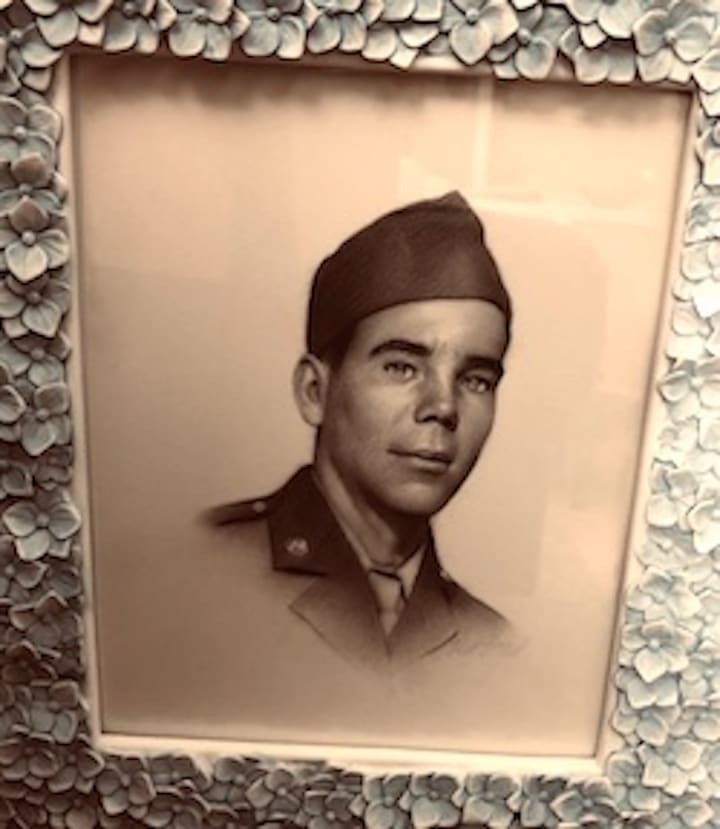
One day, she ran into a young soldier home from World War II, who would end up being my Daddy. (He had lied about his age and joined the war when he was barely 16, because he wanted to fight Hitler; but spent those years in the Pacific Theater, on the Japanese front.) What a coincidence that this was the same annoying boy from her Missouri hometown, who had sat behind her in the very early grades—and (as a young boy with a crush) who used to dip her pigtails in his ink well, to show his affection! (They were separated as children, when they both had to quit school to help out at home.)
After falling in love, it was absolutely devastating when Pa'apaw objected and said he would disown her if she married him. Pa'apaw never said why he felt so strongly against my father... But, we all know it was because Daddy had black ancestry. His father's family had descended from multi-racial slaves due to their "master" visiting the slave-quarters, as was a horrid, but common situation back in the days before the Civil War. Most of my Daddy's siblings looked totally white, except for one sister (my favorite Aunt on his side of the family). In small towns, everybody knows your business, even though my Daddy could pass either way.
Some of you reading this account may find it surprising that my Pa'apaw would be racist, after suffering from being labled a "half-breed", himself. I like to think that perhaps he was worried about OTHER people's racism because he didn't want his daughter to go through any of the same type of anguish he did... On the other hand, it's not common-knowledge (and although my great-grandmother never ever mentioned such a thing among her ancestry); but some of the Native American tribes had slaves, too, from people they had captured. The big difference was that their slaves could gain their freedom if they agreed to join their tribe. No matter his reasons, there is nothing that could justify Pa'apaw's objections. So, when he put his foot down, Mama stepped over it and proceeded with her wedding without him walking her down the aisle.
Mama taught me that: "Love conquers all!" And it did... after we grandchildren started coming along, love for us overcame Pa'apaws racism and he and Ma'amaw began to visit regularly, and fences were mended. Pa'apaw tried his best to make up for his foolishness, over the years. Rather than being bitter, my Daddy and Mama used to laugh about how silly the entire situation had been.
Before-and- after birth control was invented:
Mama went on to have seven more children, making eight total. Everybody had a big family back then. (You have to remember that there was no such thing as birth control back then!) She gave birth to all of us at home, except for the last three. (I enjoy the story of how I was born on her kitchen table, because the doctor who made the house-call had hurt his neck, and needed something higher than a bed.)
Mama loved children, but when her last one died in childbirth, from the cord being wrapped around the baby's neck, she decided there would be no more. I've never seen her so sad... and I've never seen a casket so little, as when we buried my baby sister. Daddy choked up when he told us she was the prettiest baby of us all. Mama held all her grief inside; but sometimes when she thought nobody was looking, she'd pull out a tiny yellowed newspaper clipping announcing the death of her baby, and silently stare at it, until she heard someone coming; then she'd quickly put it back into the drawer.
So, when it was finally invented, Mama went to Planned Parenthood and got on the new-fangled "pill". Unfortunately, nobody realized how unsafe the first batches were; and Mama suffered a major stroke. She was in the hospital for three entire months. Ma'amaw came to care for her there, because Mama couldn't walk—she couldn't even feed herself, at first. But, she worked hard at physical therapy and eventually regained all her capacites back, except thereafter always being weak on one side. I also noticed she could only crochet in circles after that, so everything she made was always circular—round pillow, round afghans. Mama certainly taught me persevearance!
Protecting her children from her memory loss:
But, what I DIDN'T notice was that she had lost her short-term memory for good. She hid it from us very well, that she thought her three oldest children were still babies and toddlers—and she had absolutely no memory whatsoever, of any of the rest of us kids! I was the middle child, only 12 years-old. I attributed Mama being "different" to her stroke. Because we hadn't been allowed to visit her in the hospital, none of us children ever suspected that Ma'amaw had been bringing in photos of us kids day-after-day to try to help Mama "get to know" her own children. Mama had to grow to love us again from scratch—which must have been so difficult for her! I really admire how she put our feelings ahead of her own, and made sure we never ever suspected. (I only found out after her death.)
Love your spouse through bad times, not just the good times:
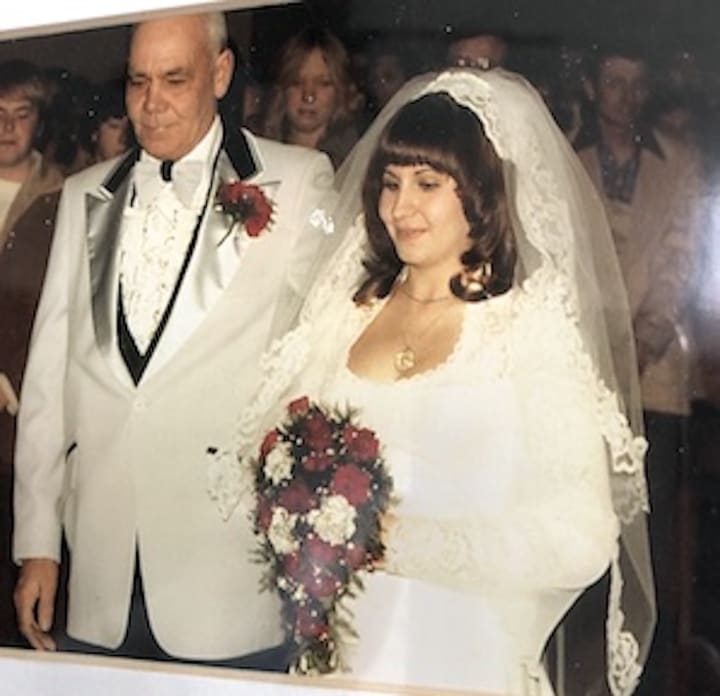
Daddy served in the Korean War and came back never the same, according to Mama. He suffered from PTSD which resulted in a drinking problem. Mama stood by him through multiple job losses and rehabs, as he constantly battled alcoholism. Yet even though we were poor, Mama made sure we NEVER went hungry. She was obsessive about making sure she knew what was going to be for lunch and for supper before breakfast was barely done. She had everything planned, and prepared all that she could by 10:00 a.m., or else she couldn't relax—an efficiency that became my habit, too. I remember one especially lean time when I was about four years-old, when Mama let me and my younger sister go with her out in the woods as she gathered Polk Salad so we'd have something to eat. I wish I had been old enough to listen better as she pointed out what growth was edible and what was poison, just as my great-grandmother had taught her.
When I was in 4th Grade, our house burned down to the ground. The only thing Mama cried over losing, was irreplaceable photos of beloved family members. As for the material things? Mama would quote from (Ecclesiastes 5:15-16) about how: "You came into this world naked, and we'll go out the same way." She instructed: "We can't carry anything away. So, the most important thing is to make a good name with God."
Daddy had to quickly find a place for us to live THAT VERY NIGHT. He promised Mama that the nine of us (two parents and seven children) would only be crammed into the three-room house for a few days—a week, tops. Well, that week turned into almost a year. But, as always, Mama was not a complainer, she'd adjust her apron and deal with whatever was her lot in life.
Lighting the torch for restaurants not wasting left-overs:
On top of raising us kids, Mama worked at nights in the kitchens of several different restaurants during those difficult years, to help us get into a bigger home. She was appalled when she saw them throwing away good left-overs at the end of her shifts! "It's a sin to throw away good food when people are going hungry! This food ought to be given to the homeless!" Mama exclaimed. When her bosses objected that they couldn't because what if the homeless got food poisoning; Mama responded: "Buy another refrigerator! Besides, there's less chance of getting food poisoning from this good food than from the hungry eating out of your trash, isn't there?"
She never stopped harping on the matter. When they continued to refuse, Mama started to bring home some of the left-overs home, to feed her own children. When her bosses objected, she stood firm: "Fire me if you want, but my children could use this food." (None of us ever got sick from eating those left-overs.) Through the years, other restaurant employees picked up the torch that employees such as my Mama, lighted; and nowadays many restaurants DO provide left-overs to homeless shelters! (However, it's still a shame that there continues to be way too much waste of good food.)
Losing the love of her life; and coping by feeding the hungry:
Despite his problems, Daddy was a joy for a husband—and for my father. He lived long enough to give me away at my wedding. When he died of a massive sudden heart attack a few years later, Mama was so devastated. She had lost the love of her life! But, she dealt with it the best way she knew how... She threw herself into cooking and feeding others; family members, friends, strangers—and especially, anybody whom she thought might be going hungry. She taught me compassion. (Years later my husband and I took in a homeless teenager for two years, until we were able to track down his family— something I never would have considered doing, without Mama's influence.)
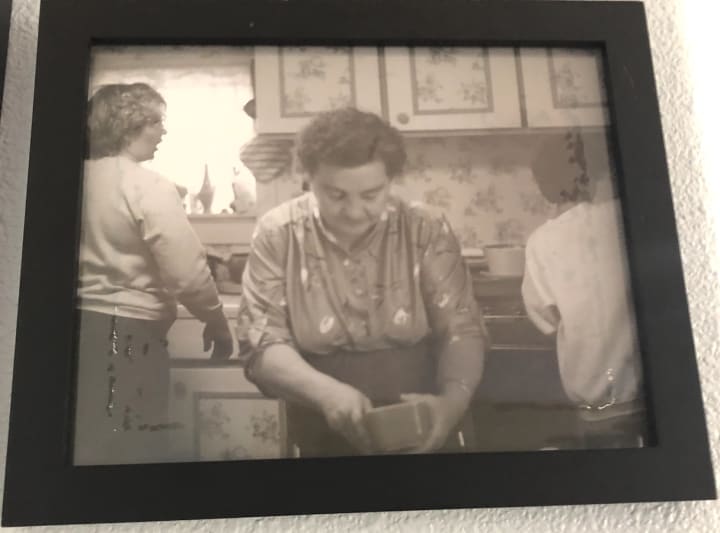
Losing my Mama to humankind's greatest enemy, death:
After several more devasating strokes, (and scarring in the brain from her first major stroke), Mama taught me humility as she agreed to wear a helmet for the rest of her life in order not to damage her head any more during the frequent violent seizures she had sadly developed. We got her into an independent living apartment; but that turned out to be not enough. We, her grown children, took turns staying with her.
You can imagine how awful I felt when it was my turn, and she was extra-weak from having the flu, and I dropped her trying to get her to the restroom, and banged her nose pretty badly! I was so upset that at 3:00 a.m. in the morning, I called all my siblings. We decided over conference-call that it was time we needed help. Mama spent the rest of her life in a nursing home, sadly. But, like all of her life, she made the best of things.
She died quietly and suddenly, when a blood clot slipped into her heart. I bought her a new pink dress that I wished I had purchased for her when she was still alive and could enjoy it, rather than having to wear it in a casket.
You may be shocked to read that my family doesn't believe that all good people go to heaven—just a few to fill government positions up in heaven to help God's Son rule over the rest of us, living forever on Earth. (Revelation 5:10; Psalm 37:29) The Earth will eventually be transformed into the kind of Paradise that most people with Native American ancestry treasure—and that God originally intended (and still purposed) for humankind... Relief for the animals is a big part of that promise that I appreciate. (Hosea 2:18) Mama's favorite Bible verse was (Psalm 72:16)... She liked it because no child (or anyone) will ever have to go hungry again, because it promises: "There will be an abundance of grain on the earth; on the top of the mountains it will overflow."
How I long to see her when Mama is awakened from sleeping in death, in the future day of resurrection into a paradise Earth! She will be forever at the prime of her life—healthy and HAPPY when "the meek inherit the Earth"! (Matthew 5:5; Psalm 37:11) I take comfort in (Job 33:25): "Let his flesh become fresher than in youth; let him return to the days of his youthful vigor."
Conclusion... The world was better when Mama was in it:
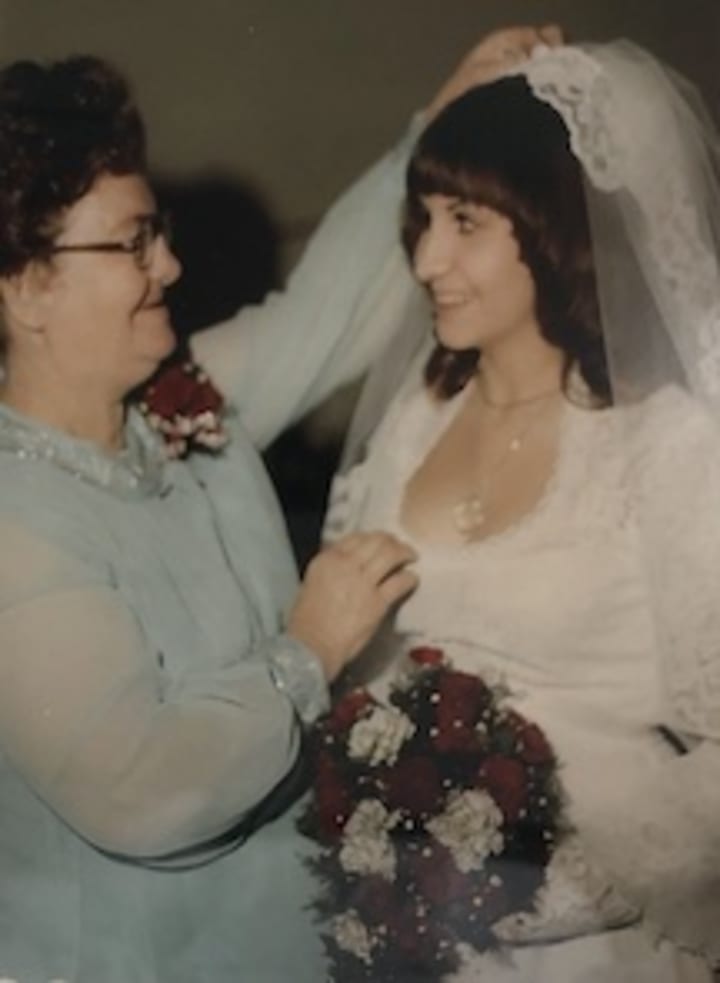
Only recently, a famous singing duo from my Mama's era, hired my cousin's charter fishing boat; and during conversation of where they were from, they asked my cousin if he knew Dortha Fox. When they found out he was related, they explained how they were hungry as little boys; and went to the same church. Mama would tell them to come to her house after church, and she would feed them a portion of their Sunday dinner. (Mama used to tell me: "You can always water down a soup to make room for a few more at your table.") My cousin said they were very sad to learn that Dortha had died.
I had no idea she helped to feed children who became famous! (Mama was not a name-dropper; and I resolved not to be a name-dropper either, after my son started working with many famous musicians and TV personalities in his career.) Even after her death, Mama was still teaching me humility. Clear as day, I can remember her instructing: "Don't ever get too big for your britches!" If she ever feared we were idolizing someone we admired on TV, she'd chide: "Remember, they put their pants on in the morning one leg at a time, same as everyone else."
My daughter has inherited my Mama's drive—she makes me tired just watching her work! She has also inherited her skill and love for cooking and feeding others. Although, my daughter enjoys and is proficient at using all the modern, Pampered-Chef air fryers, etc. when she cooks.
In contrast, my Mama never liked that old, popular slogan when gas stoves were the latest invention: "Now, we're cooking with gas!" Mama used to lament she regretted giving up her old wood cook stove, for a gas one... I recall how she used to be so skilled at knowing just when to add or stir the burning logs for the correct temperature.
The hungry people who were fed by my Mama over the years are too numerous to recount. But more than physical food, she selflessly fed them spiritually and emotionally, too—which is even more appreciated! I miss my Mama every day. The world was much better, when she was in it.
About the Creator
Karla Bowen Herman
I've always wanted to be an author, ever since I was a little girl. Time has a way of flying by when you're raising a family. But, I've discovered you're never too old to start! May something I write someday, lift someone's heart.

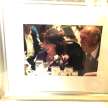
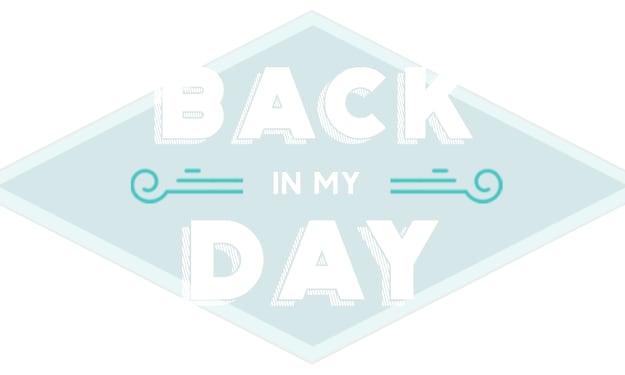



Comments
There are no comments for this story
Be the first to respond and start the conversation.